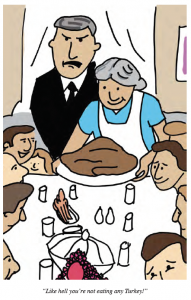Surviving as a vegetarian on Thanksgiving Day
November 18, 2020
Thanksgiving is almost here. For most people, that means family reunions, stuffing your face and spreading cheer. But for vegetarians, this time of the year is especially draining. This will be my ninth year celebrating Thanksgiving as a vegetarian, but I can guarantee my family will still ask why I’m not eating the turkey despite the number of times I told them that I don’t eat meat. Many people have expectations about what is eaten on Thanksgiving and breaking those traditions can spark questions, criticism and sometimes even anger. With that being said, here are some tips for surviving Thanksgiving as a vegetarian.
1) Ask what’s in the food before you eat it
Not all food that looks vegetarian, is vegetarian. Most stuffing is made with chicken broth and gravy is literally meat juice. Saying that chicken broth and gravy is vegetarian-friendly would be like saying orange juice is no

t made with oranges. Don’t just ask if something is vegetarian, specifically ask what ingredients were used because people who eat meat don’t typically think about what is actually considered meat.
2) Bring your own food
Depending on what your family typically makes for Thanksgiving, it might be a good idea to bring food you know you can eat. Before I thought to bring my own food, my plate would be half mashed potatoes and half green bean casserole. This was totally fine with me since those are my favorite holiday foods, but my relatives weren’t too happy when there wasn’t enough left for them. Bottom line: If you think you’ll have to take more than your fair share of sides to feel full, bring food with you.
3) Don’t mention that you’re vegetarian unless people ask
Trust me — people will notice if you refuse turkey on Thanksgiving, and they will ask about it! If you tell people that you’re vegetarian unprompted, you will likely bring even more attention to yourself and risk falling into that “vegetarians never shut up about being vegetarian” stereotype. And who knows, maybe they won’t even notice and you can enjoy the holiday without confrontation.
4) Know who you’re talking to
Over the years, I’ve learned that my family won’t take “I care more about animals than eating meat” as a reasonable excuse. If you’re talking to hunters or people who refuse to acknowledge where meat comes from, it’s a good idea to avoid the animal activist aspect of vegetarianism. “I just want to be more healthy,” can also put you on thin ice since that response typically sparks an argument about protein and iron. I’ve learned that the most efficient way to drop the conversation is to say, “I just don’t like how it tastes.”
5) Keep your cool
I don’t know why, but a lot of meat eaters are insistent on making vegetarians uncomfortable. Whether it’s little side comments about how “you probably eat a lot of kale,” or over-exaggerated pleasure while gnawing the meat from the bone, they are only trying to get on your nerves. Be the bigger person and don’t get offended, or, at least don’t let them know that you’re offended.
6) Remember it’s a dinner, not a debate
Not everyone will understand why you chose to be vegetarian, but it’s important to know when to change the subject. I can’t tell you how many times I’ve wasted my breath in an argument about eating meat and the negative impacts it has on health and the environment, only for it to go in one ear and out the other while they continue to lecture about protein and how the animals “are going to be killed anyways so why not just eat it?” No matter how insensitive a person is about the subject, it’s easier to avoid debating altogether and leave it at, “It’s my choice.”













